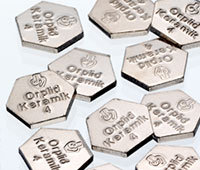
Orplid Keramik 4
Type 4
white / Au 74.5
| Composition: | Au 74.5 / Pt 10.2 / Pd 10.0 / In 2.9 / Ag 1.7 / Sn 0.5 / Cu 0.1 / Ir 0.1 |
| Standard: | DIN EN ISO 22674 + DIN EN ISO 9693 |
| Colour: | white |
| Melting range °C: | 1280–1130 |
| Soft annealing: | 15 mins at 900 °C / quench in water |
| Hardening: | 15 mins at 600 °C / air |
| Preheating temperature °C: | 850 |
| Casting temperature °C: | 1440 |
| Further heating after melting (secs): | elect.: 120–180 inductive: 5–10 flame: 5–10 |
| Density g/cm3: | 17.8 |
| CTE 25°C–500°C (µm/mK): | 14.3 |
| CTE 25°C–600°C (µm/mK): | 14.5 |
| Soldering before firing: | Orplid Ceramic solder 1070 (white), Orplid Ceramic solder 1050 (yellow) |
| Soldering after firing: | Orplid solders 760, 735 |
| Vickers hardness (HV 5/30) | w: 150 a: 260 g/b: 200 |
| 0.2% proof stress (MPa): | w: 220 a: 535 g/b: 430/505 |
| Elongation at break (%): | w: 23 a: 5 g/b: 14/13 |
| Spruing: | Following the rules for dental applications (see General Instructions for Use) |
| Investment: | Phosphate-bonded investment materials |
| Preheating: | 850 °C, 30 to 120 mins until end temperature, depending on size of mould |
| Casting: | 1440°C graphite crucible or open flame with ceramic crucible. |
| Finishing: | With carbide burs and/or ceramic-bonded stones. Always grind in one direction only! Avoid using high speeds or applying heavy pressure (scale formation); sandblasting with 50–125 µm aluminium oxide. Pressure should not exceed 2 bar |
| Cleaning: | Steam jet cleaning or boiling in distilled water |
| Oxide firing: | 5 mins at 960°C without vacuum |
| Soldering before firing: | Orplid Ceramic solder 1070 (white), Orplid Ceramic solder 1050 (yellow) |
| Soldering after firing: | Orplid solders 760, 735 |
| Firing: | For normally expanding ceramic materials |
